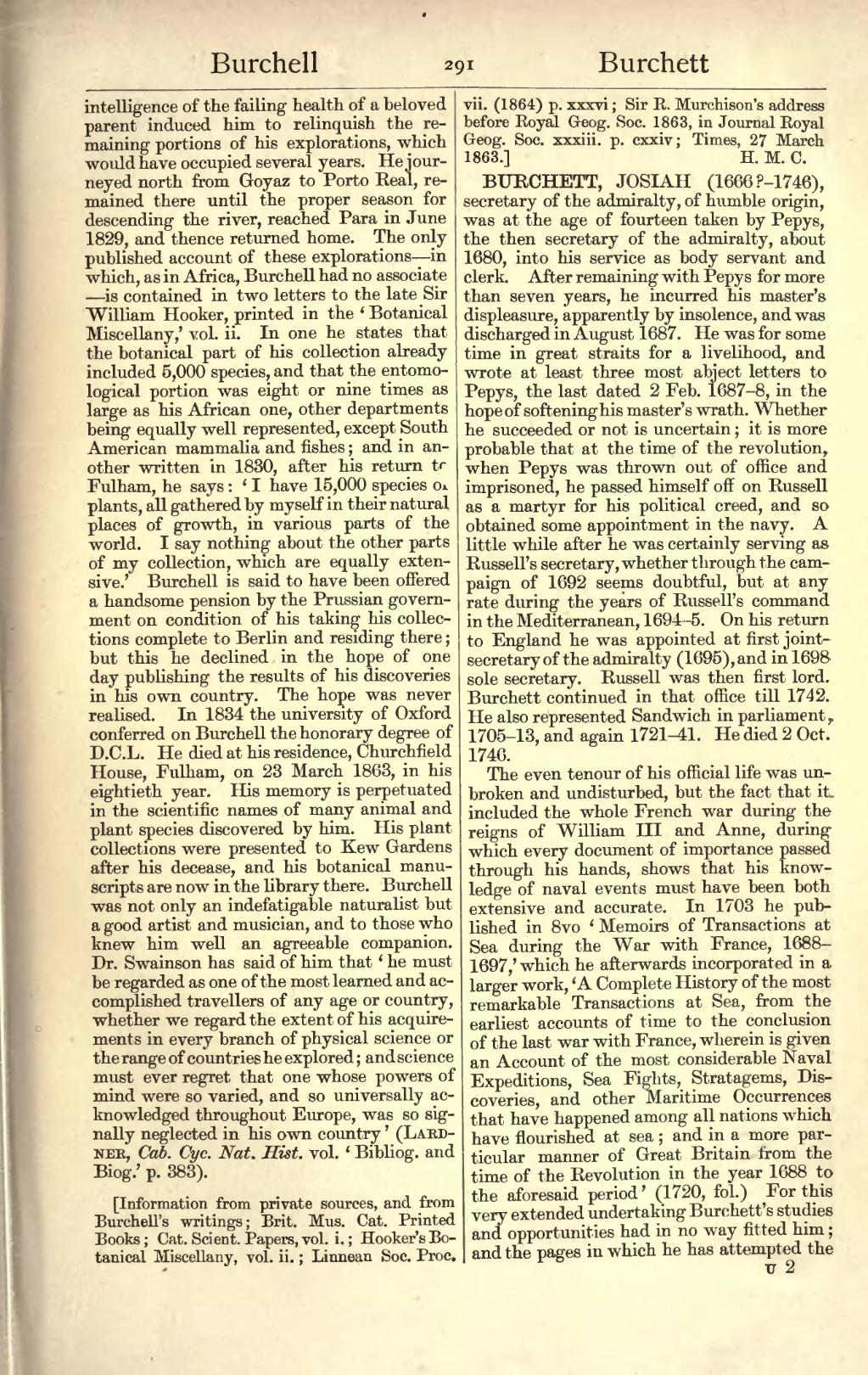intelligence of the failing health of a beloved parent induced him to relinquish the remaining portions of his explorations, which would have occupied several years. He journeyed north from Goyaz to Porto Real, remained there until the proper season for descending the river, reached Para in June 1829, and thence returned home. The only published account of these explorations—in which, as in Africa, Burchell had no associate—is contained in two letters to the late Sir William Hooker, printed in the ‘Botanical Miscellany,’ vol. ii. In one he states that the botanical part of his collection already included 5,000 species, and that the entomological portion was eight or nine times as large as his African one, other departments being equally well represented, except South American mammalia and fishes; and in another written in 1830, after his return to Fulham, he says: ‘I have 15,000 species of plants, all gathered by myself in their natural places of growth, in various parts of the world. I say nothing about the other parts of my collection, which are equally extensive.’ Burchell is said to have been offered a handsome pension by the Prussian government on condition of his taking his collections complete to Berlin and residing there; but this he declined in the hope of one day publishing the results of his discoveries in his own country. The hope was never realised. In 1834 the university of Oxford conferred on Burchell the honorary degree of D.C.L. He died at his residence, Churchfield House, Fulham, on 23 March 1863, in his eightieth year. His memory is perpetuated in the scientific names of many animal and plant species discovered by him. His plant collections were presented to Kew Gardens after his decease, and his botanical manuscripts are now in the library there. Burchell was not only an indefatigable naturalist but a good artist and musician, and to those who knew him well an agreeable companion. Dr. Swainson has said of him that ‘he must be regarded as one of the most learned and accomplished travellers of any age or country, whether we regard the extent of his acquirements in every branch of physical science or the range of countries he explored; and science must ever regret that one whose powers of mind were so varied, and so universally acknowledged throughout Europe, was so signally neglected in his own country’ (Lardner, Cab. Cyc. Nat. Hist. vol. ‘Bibliog. and Biog.’ p. 383).
[Information from private sources, and from Burchell's writings; Brit. Mus. Cat. Printed Books; Cat. Scient. Papers, vol. i.; Hooker's Botanical Miscellany, vol. ii.; Linnean Soc. Proc. vii. (1864), p. xxxvi; Sir R. Murchison's address before Royal Geog. Soc. 1863, in Journal Royal Geog. Soc. xxxiii. p. cxxiv; Times, 27 March 1863.]
BURCHETT, JOSIAH (1666?–1746), secretary of the admiralty, of humble origin, was at the age of fourteen taken by Pepys, the then secretary of the admiralty, about 1680, into his service as body servant and clerk. After remaining with Pepys for more than seven years, he incurred his master's displeasure, apparently by insolence, and was discharged in August 1687. He was for some time in great straits for a livelihood, and wrote at least three most abject letters to Pepys, the last dated 2 Feb. 1687–8, in the hope of softening his master's wrath. Whether he succeeded or not is uncertain; it is more probable that at the time of the revolution, when Pepys was thrown out of office and imprisoned, he passed himself off on Russell as a martyr for his political creed, and so obtained some appointment in the navy. A little while after he was certainly serving as Russell's secretary, whether through the campaign of 1692 seems doubtful, but at any rate during the years of Russell's command in the Mediterranean, 1694–5. He was appointed at first joint-secretary of the admiralty (February 1693–4), and in 1698 sole secretary. Russell was then first lord. Burchett continued in that office till 1742. He also represented Sandwich as a whig in parliament, 1705–13, and again 1722–41. He died 2 Oct. 1746.
The even tenour of his official life was unbroken and undisturbed, but the fact that it included the whole French war during the reigns of William III and Anne, during which every document of importance passed through his hands, shows that his knowledge of naval events must have been both extensive and accurate. In 1703 he published in 8vo ‘Memoirs of Transactions at Sea during the War with France, 1688–1697,’ which he afterwards incorporated in a larger work, ‘A Complete History of the most remarkable Transactions at Sea, from the earliest accounts of time to the conclusion of the last war with France, wherein is given an Account of the most considerable Naval Expeditions, Sea Fights, Stratagems, Discoveries, and other Maritime Occurrences that have happened among all nations which have flourished at sea; and in a more particular manner of Great Britain from the time of the Revolution in the year 1688 to the aforesaid period’ (1720, fol.) For this very extended undertaking Burchett's studies and opportunities had in no way fitted him; and the pages in which he has attempted the
